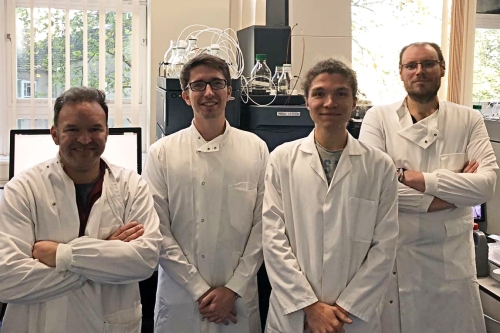Natural product antibiotics from the deep-sea
Exploring deep-sea environments to find new natural products with antimicrobial activity
What is the problem?
The antibiotic discovery pipeline is depleted with no new class of antibiotics developed since the 1980's. Restoring the antibiotic discovery pipeline is an urgent race against time to find novel classes of antibiotics.
The deep ocean is the largest habitat for life on Earth, though the microorganisms that occupy this unique environmental niche remain largely unexplored. Due to the significant logistical and operational challenges associated with accessing the deep ocean, bioprospecting programmes that seek to generate novel products from marine organisms have, to date, focused predominantly on samples recovered from shallow seas. For this reason, the deep ocean remains a largely untapped resource of novel microbiological life and associated natural products.
Potential solution
As marine natural products are an untapped reserve of potential antibacterial agents, Prof Paul Race (School of Biochemistry/BrisSynBio) and his team are combining the innovations of synthetic biology with remote robotic environmental sampling to find new leads in the fight against AMR. The team has been recovering environmental samples from unexplored regions of the Atlantic Ocean sea bed and has isolated over a thousand uncharacterised microorganisms and new natural product based antibiotic leads. The team are bioprospecting marine sponges, gathered from the Atlantic ocean by geochemist, Dr Kate Hendry (School of Earth Sciences), for novel antimicrobials which involves culturing rare deep-sea sponge-associated bacteria to isolate promising antibiotic producers from this previously untested and isolated environment.
The team have established the Bristol Sponge Microbiome Collection (BISECT), a unique repository of deep-sea microorganisms and associated metabolites isolated from the microbiota of marine sponges, recovered from previously unsurveyed regions of the mid-Atlantic Ocean, at depths of 0.3–3 km.
Next steps
An integrated biodiscovery pipeline comprising molecular, genetic, bioinformatic and analytical tools is being applied to interrogate this collection to identify lead compounds and test them against multiple strains of resistant bacteria.
The potential of this approach to identify antimicrobial natural product lead compounds and prospects for the use of BISECT to address allied pharmaceutical needs, along with mechanisms of access to the collection are discussed in a recent paper: 'The Bristol Sponge Microbiome Collection: A Unique Repository of Deep-Sea Microorganisms and Associated Natural Products'

Researchers involved
- Prof Paul Race (School of Biochemistry)
- Prof Chris Willis (School of Chemistry)
- Dr Catherine Back (School of Biochemistry)
- Dr Kavita Tiwari (School of Biochemistry)
- Dr Martin Challand (School of Biochemistry)
- Jorge Ojeda Gomez (School of Biochemistry)
- Dr Paul Curnow (School of Biochemistry)
- Dr Kate Hendry (School of Earth Sciences)
- Sam Williams (School of Biochemistry)
- Henry Stennett (School of Biochemistry)
External collaborators
- Angela Essex-Lopresti (Defence Science and Technology Laboratory, Porton Down)
Funding
- BrisSynBio - a BBSRC/EPSRC Synthetic Biology Research Centre
- EPSRC SynBio CDT studentship (Henry Stennett)
- GW4 MRC Biomed DTP studentship (Sam Williams)
Contact
Prof Paul Race
email: paul.race@bristol.ac.uk
Tel: +44 (0)117 33 11835
Dr Paul Curnow
email: p.curnow@bristol.ac.uk
Tel: +44 (0)117 33 11837
Press releases and useful links